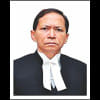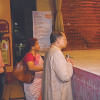One step forward to digitisation
After 144 years of writing down the testimonies and cross examinations by hand, 20 courts of Sylhet yesterday started doing those things digitally, a first in the country.
The system would be gradually installed in all courts of the country.
Chief Justice Surendra Kumar Sinha inaugurated the “digital evidence recording” in 20 courts of the 40 in Sylhet on the Judges' Court premises yesterday.
Recording of testimonies of witnesses via audio and video would be introduced in future, Supreme Court sources said.
The depositions of witnesses and their cross examinations are hand written by the judges concerned in courts and then they are typed. This is time-consuming.
But in the 20 courts, statements and cross examinations will be composed on computers by stenographers from now on; in front of the judges, prosecution and defence lawyers, plaintiffs, and witnesses, Sabbir Foyez, additional registrar of the High Court Division of the Supreme Court, told The Daily Star.
The judges, lawyers, plaintiffs, and witnesses will be able to watch on the monitors if the records were being made correctly, he said, adding that if a recording was incorrect, it could be fixed instantly.
Sabbir said the records would be preserved in tamper-proof computers and copies of the records would be printed after they are recorded correctly.
The copies would be provided to the judges and lawyers after they were signed by officials concerned, he said, adding that the same system would be introduced in phases at all courts of the country.
He said the system would speed up trials and therefore reduce the backlog of cases at courts, the suffering of justice seekers, and save their money.
Similar systems would be set up in courts of nine districts, including Dhaka, Rajshahi, Chittagong, Khulna, Barisal, Rangpur, and Sylhet within this year, Sabbir said.
He said the testing of the system started in the Sylhet courts seven to eight months ago.
At the appellate and high court divisions of the SC, a digitised system was already in place for listing the serial numbers of cases and bail confirmations.
Replying to a query, Sabbir said the United Nations Development Programme financed the digitised deposition recording system in Sylhet.
Finance Minister AMA Muhith, who was at the inauguration programme, assured that his ministry would allocate Tk 10 crore for setting up the system in other courts of the country.
He said 10 to 15 years' time would be needed to have an e-judiciary.
Chief Justice Sinha at the function urged all to stay alert while making comment on the judiciary.
He said some judgments have been pending with few judges who have retired six to seven years ago.
The chief justice said the people in television talk-shows do not say anything against this practice. They rather speak in such a manner that appears to malign the chief justice.
He said, "Today, our country's media has achieved a lot. Today we see a lot in the media. Discussions take place in talk shows at night. Discussions on the judiciary are held in the electronic and print media. I want to tell everyone in this programme, we have the media liberty. Freedom of press is guaranteed under article-39 of the constitution. But this freedom is subject to some restrictions. Excess liberty does not bring people's well-being. It should have a limit. "
Justice Sinha said the problem with huge backlog of 30 lakh pending cases could be resolved, if the older laws were updated.
Amid the lawyers' demand, Law Minister Anisul Huq assured them of taking steps to install lifts in court buildings, constructing bridges to connect the bar and court buildings, and allocate Tk 5 lakh for its library.
Justice Md Imman Ali of the Appellate Division, State Minister for ICT Division Zunaid Ahmed Palak, UN Resident Coordinator Robert Watkins, also spoke at the meeting presided over by Sylhet District Judge Munir Hosain Patuary.
Our correspondent in Sylhet contributed to this report.

 For all latest news, follow The Daily Star's Google News channel.
For all latest news, follow The Daily Star's Google News channel. 








Comments